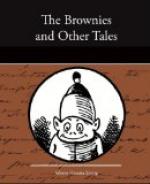So Amelia kept her own counsel. But she had one confidant.
When her parents brought the stock home on the night of Amelia’s visit to the haycocks, the bulldog’s conduct had been most strange. His usual good-humour appeared to have been exchanged for incomprehensible fury, and he was with difficulty prevented from flying at the stock, who on her part showed an anger and dislike fully equal to his.
Finally the bulldog had been confined to the stable, where he remained the whole month, uttering from time to time such howls, with his snub nose in the air, that poor Nurse quite gave up hope of Amelia’s recovery.
“For indeed, my dear, they do say that a howling dog is a sign of death, and it was more than I could abear.”
But the day after Amelia’s return, as Nurse was leaving the room with a tray which had carried some of the light nourishing diet ordered by the doctor, she was knocked down, tray and all, by the bulldog, who came tearing into the room, dragging a chain and dirty rope after him, and nearly choked by the desperate efforts which had finally effected his escape from the stable. And he jumped straight on to the end of Amelia’s bed, where he lay, thudding with his tail, and giving short whines of ecstasy. And as Amelia begged that he might be left, and as it was evident that he would bite any one who tried to take him away, he became established as chief nurse. When Amelia’s meals were brought to the bedside on a tray, he kept a fixed eye on the plates, as if to see if her appetite were improving. And he would even take a snack himself, with an air of great affability.
And when Amelia told him her story, she could see by his eyes, and his nose, and his ears, and his tail, and the way he growled whenever the stock was mentioned, that he knew all about it. As, on the other hand, he had no difficulty in conveying to her by sympathetic whines the sentiment, “Of course I would have helped you if I could; but they tied me up, and this disgusting old rope has taken me a month to worry through.”
So, in spite of the past, Amelia grew up good and gentle, unselfish and considerate for others. She was unusually clever, as those who have been with the “Little People” are said always to be.
And she became so popular with her mother’s acquaintances that they said—“We will no longer call her Amelia, for it is a name we learnt to dislike, but we will call her Amy, that is to say, ‘Beloved.’”
* * * * *
“And did my godmother’s grandmother believe that Amelia had really been with the fairies, or did she think it was all fever ravings?”
“That, indeed, she never said, but she always observed that it was a pleasant tale with a good moral, which was surely enough for anybody.”
THE END.
Richard Clay & Sons, Limited, London & Bungay.




